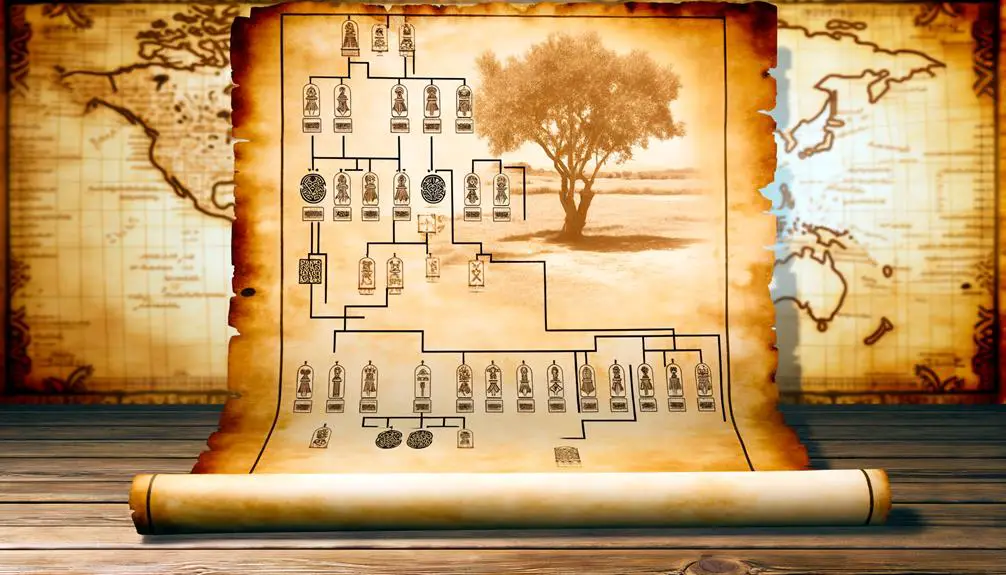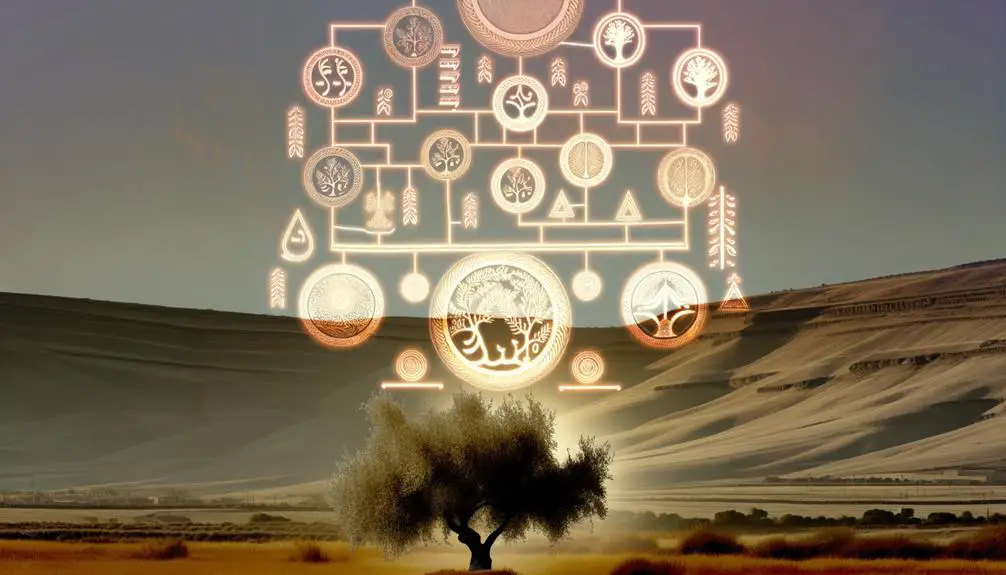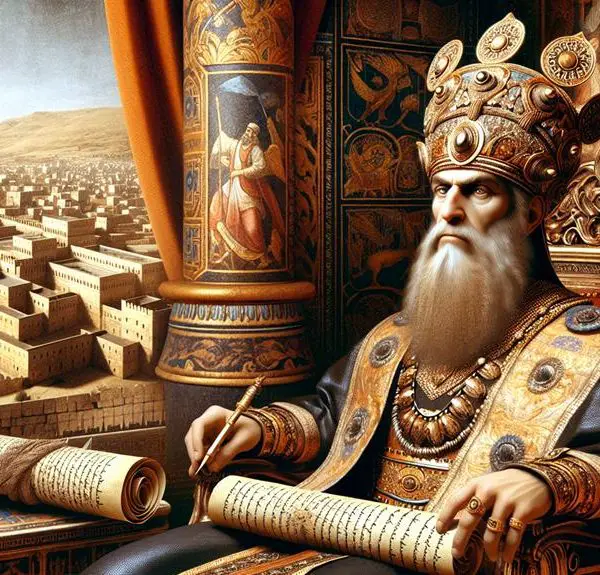Trace the lineage of Israel's first king through Kish, whose story of lost donkeys led to a kingdom's birth and a legacy's unfolding.

Kish in the Bible
As you walk through the tapestry of biblical narratives, you'll stumble upon Kish, a figure whose lineage is as rich as the soil of ancient Israel. As the father of Saul, Israel's first king, Kish's story is more than just a thread in the fabric of scripture; it's a pivotal anchor that holds fast the unfolding of Israel's monarchy.
His quest for lost donkeys set in motion events that would forever alter his family's destiny and the course of a nation. Let's explore the layers of Kish's life and legacy, where you'll find intrigue and revelations that beckon for a closer look.
Key Takeaways
- Kish, Saul's father from the tribe of Benjamin, played a critical role in Saul's divine anointment as Israel's first king.
- Kish's lineage and societal standing highlight the interplay of divine selection and human lineage in biblical narratives.
- The story of Kish and Saul underscores the theme of divine intervention and destiny in the establishment of the Israelite monarchy.
- Kish's contribution to the biblical narrative enriches our understanding of faith, leadership, and the complexities of divine-human interactions.
The Identity of Kish

Who was Kish in the biblical narrative, and what significance does his identity hold in the broader scriptural context?
Kish, a figure emerging from the Hebrew Bible, is primarily known as the father of Saul, the first king of Israel. This connection alone cements his place in the annals of Judeo-Christian history. However, to fully appreciate Kish's role, one must delve deeper into his background, specifically focusing on Kish's occupation and geographic origin, which are pivotal in understanding the socio-political landscape of ancient Israel.
Kish's occupation isn't explicitly detailed in the Scriptures, yet his wealth and status are hinted at through descriptions of his family's capacity to maintain servants and engage in significant recovery efforts for lost livestock. This suggests Kish was a man of substantial means, likely involved in agriculture or animal husbandry, occupations of considerable importance in the agrarian society of ancient Israel. His ability to sustain such a lifestyle indicates not only personal prosperity but also a notable standing within his community.
His geographic origin, from the tribe of Benjamin, situates Kish within a context of turbulent history and complex tribal relations. The Benjaminites, known for their valor and warrior spirit, were also a tribe nearly decimated in inter-tribal conflicts, as recounted in the Book of Judges. Kish's lineage, therefore, places him at a crossroads of recovery and aspiration, embodying the resilience and ambition that would eventually lead to the rise of Saul as king.
Understanding Kish through the lenses of his occupation and geographic origin offers a nuanced perspective on his significance. It reveals the layers of social, economic, and political dynamics that underpinned the narrative of Israel's first king and highlights the foundational role Kish played in this pivotal chapter of biblical history.
Kish's Biblical Lineage

Delving into Kish's biblical lineage reveals a complex web of familial relationships that significantly influenced the socio-political landscape of ancient Israel. Kish, a Benjamite, is most famously known as the father of Saul, Israel's first king. This connection alone underlines his genealogical significance, situating him at a pivotal junction in Israel's history. However, Kish's lineage and family connections extend beyond this singular relationship, reflecting broader socio-political dynamics and alliances within and outside the tribe of Benjamin.
Ancestor |
Relation |
Significance |
|---|---|---|
Abiel |
Grandfather |
Connects to earlier Benjamite lineage |
Ner |
Uncle/Brother |
Complex relationship, varies in texts |
Saul |
Son |
First King of Israel, highlights Kish's role |
Kish's ancestry, traced through Abiel, establishes his roots deep within the Benjamite tribe, a tribe known for its warriors and conflicts with other Israelite tribes. This background is crucial for understanding the socio-political tensions and alliances that shaped the early monarchical period. The ambiguous portrayal of Ner, sometimes listed as Kish's brother and other times as his father, adds layers to the analysis of biblical texts and genealogies, suggesting variations in record-keeping or oral traditions over time.
Moreover, Kish's role as Saul's father not only elevates his status posthumously but also implicates him in the narratives of divine selection and rejection that permeate Saul's reign. The interplay of divine favor, political ambition, and familial loyalty in Kish's lineage offers a rich tapestry for exploring the foundations of Israelite monarchy and governance. Through Kish's family connections, we gain insights into the intricacies of biblical genealogies and their enduring significance in shaping historical and theological narratives.
The Quest for Lost Donkeys

Exploring Kish's genealogical significance further unveils an intriguing episode that underscores the providential nature of biblical narratives: the quest for lost donkeys. This account, embedded within the larger fabric of Israelite history, isn't merely a trivial pursuit but a pivotal moment laden with symbolic and practical implications. The donkey, in ancient Near Eastern cultures, wasn't just a beast of burden but a vehicle integral to the socioeconomic and daily life. Its significance in ancient travel methods can't be overstated, serving as the primary means of transport for goods, people, and messages across the rugged terrains of the ancient Near East.
The narrative unfolds as you delve deeper, revealing that the search for these donkeys wasn't a random occurrence but a divinely orchestrated event. It serves as a catalyst that propels the protagonist into a journey beyond the immediate retrieval of lost animals. This episode highlights the interconnectedness of divine providence with mundane activities, suggesting that even the most seemingly insignificant tasks can have far-reaching implications.
Analyzing this quest within the broader biblical context, it becomes apparent that the donkeys' disappearance acted as a narrative device, setting the stage for subsequent revelations and divine encounters. It underscores the principle that divine guidance often manifests in the guise of everyday challenges, pushing individuals towards their destiny.
Kish and Saul's Destiny

In the quest for his father's lost donkeys, Saul unwittingly embarked on a path that would intertwine his destiny with that of the entire nation of Israel. This seemingly mundane task set the stage for a series of divine interventions and prophetic encounters that wouldn't only alter Saul's personal trajectory but also the spiritual and political landscape of Israel.
Your analysis of these events reveals a complex web of divine orchestration. The moment Saul stepped into the realm of the prophet Samuel, the course of his life—and by extension, Kish's lineage—was irrevocably changed. Samuel, acting under divine instruction, anoints Saul as the first king of Israel, marking a pivotal moment in the nation's history. This act of anointing wasn't a mere formality but a profound declaration of Saul's divinely appointed role in God's plan for His people.
You delve deeper, noting that Saul's encounter with Samuel wasn't coincidental but a clear manifestation of divine intervention. The narrative underscores a crucial theological point: God's sovereignty in guiding the destinies of individuals and nations. Saul's rise from a simple quest for lost donkeys to becoming the king of Israel exemplifies how God uses ordinary circumstances to fulfill His extraordinary purposes.
Moreover, your analysis highlights the significance of prophetic encounters in understanding one's destiny. Saul's transformation from a seeker of donkeys to the anointed king underscores the role of prophets as divine messengers who reveal and shape the destinies of those they encounter. This narrative thread invites readers to reflect on how divine intervention and prophetic guidance continue to influence individual and collective destinies.
Legacy and Reflections

Reflecting on the profound impact of Saul's anointing, it's essential to consider the enduring legacy that this pivotal moment has left on both Kish's lineage and the broader narrative of Israel's history. As you delve deeper, you'll uncover the intricate ways in which Kish's virtues and the historical impact of Saul's reign have intertwined, leaving a lasting mark on the fabric of biblical lore.
To vividly illustrate the legacy left by Kish and Saul, consider the following:
- The Foundation of Israelite Monarchy: Kish's role in the biblical narrative set the stage for the establishment of the Israelite monarchy, a critical juncture in the nation's history. This shift from tribal confederation to a unified kingdom under Saul's leadership heralded a new era of governance, influencing subsequent generations and their understanding of leadership and divine anointing.
- The Embodiment of Kish's Virtues: Saul's reign, though fraught with challenges, also mirrored Kish's virtues of resilience and dedication. These qualities, inherited from Kish, underscored the importance of personal character in leadership, shaping the moral and spiritual expectations for future kings of Israel.
- The Historical Impact on Biblical Narrative: The story of Kish and Saul enriched the biblical narrative, providing scholars and believers alike with profound insights into God's interactions with His people. The complexities of their stories reflect the nuanced relationship between divine providence and human agency, offering enduring lessons on faith, leadership, and the consequences of actions.
In analyzing the legacy of Kish and Saul, you're reminded of the intricate tapestry of human history and divine intervention, where individual virtues and historical impacts intersect to shape a narrative far greater than the sum of its parts.
Frequently Asked Questions
How Does the Character of Kish Compare to Other Fathers Mentioned in the Bible?
When you examine fathers in historical texts, you'll notice that parental expectations and leadership qualities often define their character. In comparing Kish to others, you'd find that while many fathers set high standards, Kish's approach to leadership and expectations stands out.
He embodies a mix of stern guidance and nurturing, a balance not always seen. His method reflects a deep understanding of leadership's role in shaping character, setting him apart in the narrative.
Are There Archaeological Findings or Historical Records Outside the Bible That Confirm Kish's Existence or Story?
You're digging into history, seeking proof of tales older than your grandma's cookie recipe. Kish's lineage, a saga wrapped in mystery, beckons.
Yet, archaeological methodologies haven't unearthed concrete evidence to confirm his existence outside biblical narratives. Scholars tirelessly sift through ancient texts and relics, applying analytical rigor to every shard and scroll.
Despite their efforts, the quest remains a scholarly challenge, with Kish's story eluding definitive historical corroboration.
How Has the Story of Kish Been Interpreted or Used in Different Religious Traditions or Denominations?
You'll find Kish's lineage interpreted across various religious traditions, each embedding unique religious symbolism in his story.
Scholars dissect these narratives, highlighting how denominations extract moral and theological lessons from Kish's life.
This analytical approach reveals the depth of Kish's impact, showing you how his legacy isn't just a historical footnote but a vessel for conveying complex religious ideologies, underscoring the multifaceted ways religious traditions engage with their sacred texts.
What Moral or Ethical Lessons Are Traditionally Drawn From Kish's Life and Actions?
You're diving into how certain actions and life choices carry deep moral and ethical implications. Specifically, when you look at traits like humility and leadership, they serve as cornerstones for shaping behavior.
Analyzing these qualities, you'll find that humility often leads to authentic leadership. Drawing from Kish's humility, it's clear that true leaders don't just command respect; they earn it through genuine humility and thoughtful actions, offering profound lessons in both personal growth and guiding others.
How Has Kish's Story Been Represented in Art, Literature, or Popular Culture Throughout History?
You might find the representation of Kish's story in art, literature, or popular culture fascinating. Over time, Kish iconography and cultural adaptations have woven their way through various mediums, reflecting the times and attitudes of those interpreting the narrative.
These renditions range from classical paintings to modern digital art, each offering a unique lens through which to view the story. Scholars often analyze these depictions, uncovering layers of cultural and historical significance embedded within.
Conclusion
In your journey through the tapestry of Biblical narratives, you've encountered Kish, a figure whose lineage and actions echo far beyond the quest for lost donkeys.
This seemingly mundane event propels his son, Saul, toward a destiny intertwined with the very fabric of Israel's monarchy.
Kish's story, a mosaic of legacy and divine orchestration, serves as a testament to the unforeseen ways in which individual destinies can shape collective history, offering profound reflections on the interplay between fate and divine will.



Sign up